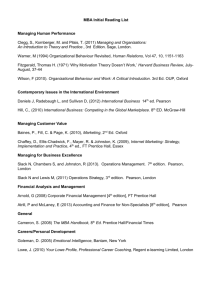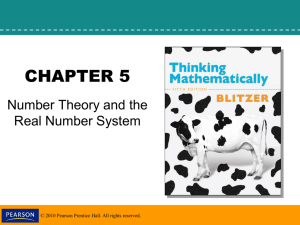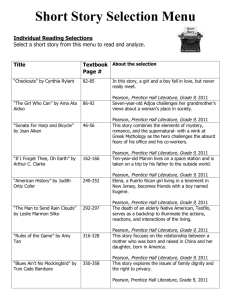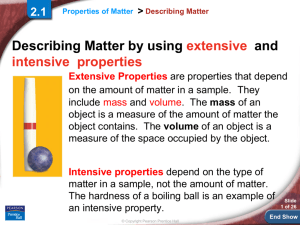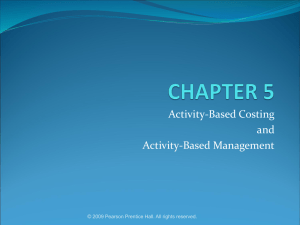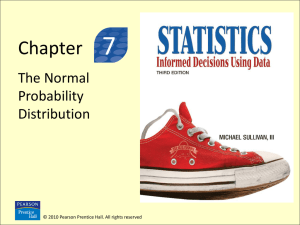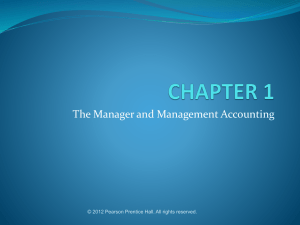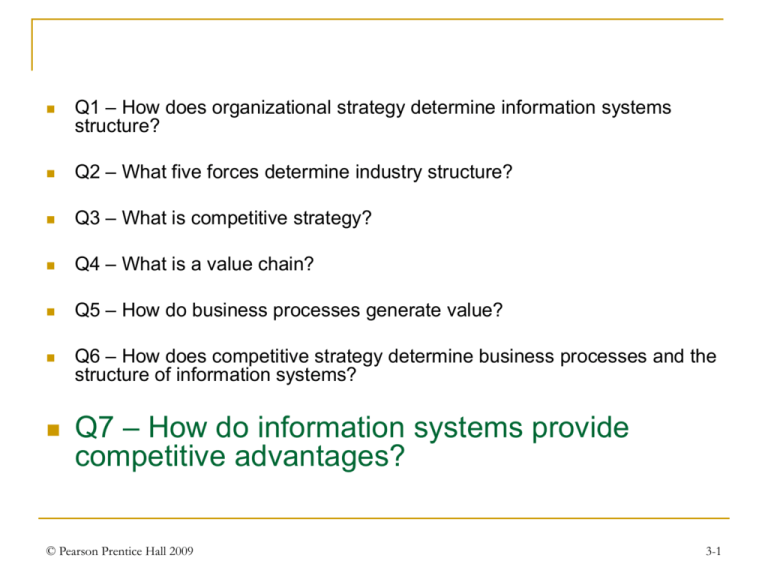
Q1 – How does organizational strategy determine information systems
structure?
Q2 – What five forces determine industry structure?
Q3 – What is competitive strategy?
Q4 – What is a value chain?
Q5 – How do business processes generate value?
Q6 – How does competitive strategy determine business processes and the
structure of information systems?
Q7 – How do information systems provide
competitive advantages?
© Pearson Prentice Hall 2009
3-1
Q7 – How Do Information Systems Provide Competitive Advantages?
There are two ways businesses can respond to the
five competitive forces.
They can gain a competitive advantage via their
products and services.
They can gain a competitive advantage by developing
superior business processes.
© Pearson Prentice Hall 2009
3-2
Q7 – How Do Information Systems Provide Competitive Advantages?
A business can gain a competitive advantage via its
products by
Creating new products and services, or
Enhancing its existing products or services, or
Apple iPhone = market leader in the Smart phone market ahead of Nokia, Palm,&
Blackberry
Stop & Shop supermarkets = grocery online shopping and home deliver (peapod online
shopping)
Differentiating its products and services from its competitors
MacBook Wheel Apple = a revolutionary laptop with a sleek touch-sensitive click wheel
instead of a keyboard
© Pearson Prentice Hall 2009
3-3
Q7 – How Do Information Systems Provide Competitive Advantages?
Information systems can help create a
competitive advantage by being part of the
product or by providing support to the product
A car rental agency that provides an information system that
produces car locations and driving instructions to destinations is
an example of information system as part of a car rental product
A car rental agency that adopts an information system that
schedule car maintenance is an example of a system that is not
part of the product, but supports the product
© Pearson Prentice Hall 2009
3-4
Q7 – How Do Information Systems Provide Competitive Advantages?
A company can gain a competitive advantage by using business
processes to
Lock in customers via high switching costs, making it too
expensive for the customer to switch to a competitor.
Companies aim to create high switching cost to lock in customers
Surgeons encounter high switching costs when after training to learn
to use specific medical devices such as artificial joint products from
one company, switching to a competitor product would require loss of
time, money , comfort and familiarity
The more customers are locked in, the more likely a company can
pass on added costs to them without risking customer loss to a
competitor
© Pearson Prentice Hall 2009
3-5
A company can gain a competitive advantage by using business processes to
Lock in suppliers via easy-to-use connections, discouraging them
from changing to another business.
Toyota Auto Manufacturer leads the way in championing supplier
relationships
Use of Keiretsu = close-knit network of vendors that continuously
learn, improve, and prosper along with their parent companies
On-site Supply manufactures = low transportation cost, quality and
delivering cars to the marketplace faster
Relationship Practices: conduct joint improvement activities through
extensive training allowing suppliers to fully integrate with
manufacturers’ processes, to develop technology and share
information intensively.
Results = faster production times, better quality, shorter time for new
car designs compared to competitors
© Pearson Prentice Hall 2009
3-6
A company can gain a competitive advantage by using business processes to
Create entry barriers for new competitors, thereby raising the costs to
enter the market.
ABC, Inc is shipper that invested heavily in information technology to gain a
competitive advantage
Impossible for new entrants to provide similar services to customers.
ABC maintains customer account data: name, address, and billing info, but also
organizations and location to which customer ships. Also data of recipients of
past shipments
Customers are locked in because ABC reduces the amount of customer work
when scheduling a shipment and reducing errors
ABC Locks in customers based on the benefits customer receive
ABC systems generate shipping labels with bare codes for the user to print
ABC provides e-mail messages to the customer, recipients, and others when
shipment is created and been delivered
ABC has extended its product from a package-delivery service to a package-andinformation –delivery system
© Pearson Prentice Hall 2009
3-7
A company can gain a competitive advantage by using business processes to
Establish alliances with other organizations and set standards,
reducing purchase costs and providing benefits for everyone.
Wal-Mart/P&G joint mission statement = to achieve the long- term business
objectives of both companies by building a total system partnership to better
serve mutual customers or consumers.
Wal-Mart adopts an automated reordering system linking computers between
Protector & Gamble and its stores and distribution centers
Integration of POS information(actual demand) from Wal-Mart systems with
P&G consumer data on why products were selling, trends, and analysis
Thus improving retailing and product development, reduced need of
inventories
The interaction and coordination between the two companies allows P&G to
lower costs and pass savings on to Wal-Mart contributing to its the “Every
Day Low Prices”
© Pearson Prentice Hall 2009
3-8
A company can gain a competitive advantage by using business processes to
Reduce costs which in turn reduces prices and increases profitability.
Del Computer Corporation PCs Just-In-Time Management made Dell
the envy of the personal computer industry and allows it to grow at five
times the industry rate
Dell orders components and assembles computers when an order is
booked
The price of PC parts can fall rapdly in just a few months translating into
profit advantage in components alone while its rivalry Compaq and IBM
machines stay on dealer shelves for months
Dell’s low cost production system allows it to under price its rivals by
10% to 15%
© Pearson Prentice Hall 2009
3-9
Information Systems That Provide Competitive advantage
Hyundai Case Study - Real Time Sales Data-Unwired
Enterprise
http://www.youtube.com/watch?v=KjMUngxZHyE
© Pearson Prentice Hall 2009
3-10

